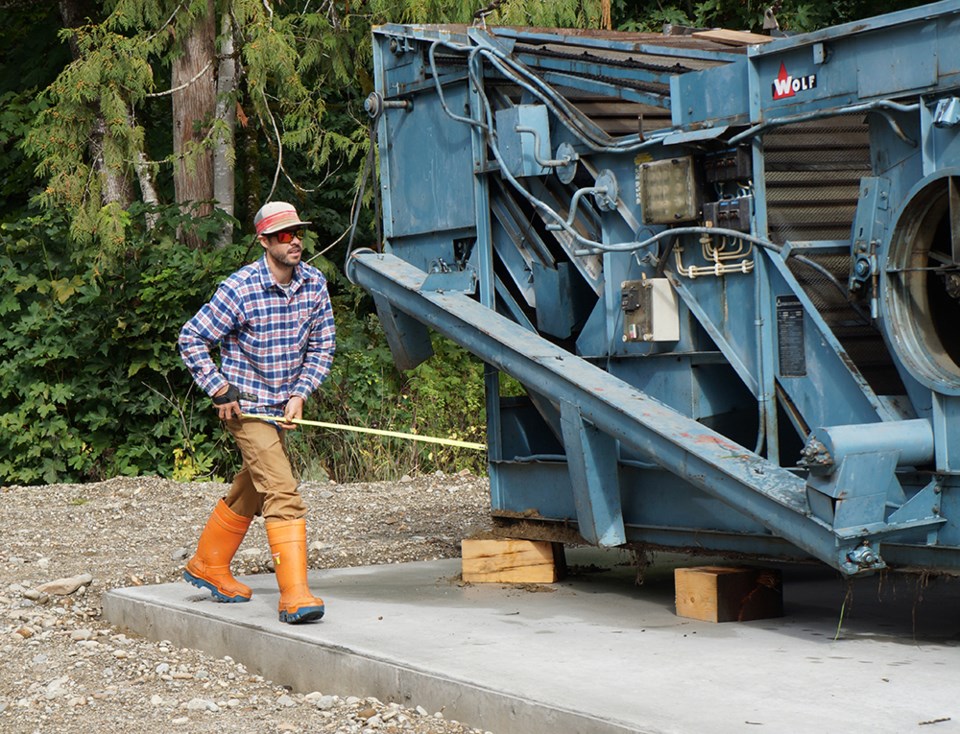Off of Squamish Valley Road, over a one-way wooden bridge and down a bumpy dirt road sits Mike Holmes’ dream.
Mountains of green fir and red cedar trees dwarf Holmes’ two-acre certified organic hops farm. Bears, elk and wolves outnumber people in this area of the upper Squamish Valley. The farm is simple; hops, which will eventually end up gulped in beer, sprout from the ends of thin green bines that rise from the mud to the sky on ropes.
There is a small recently constructed wood storage and maintenance building and a 1972 baby-blue Wolf hops harvester.
Dogs ran and barked last Thursday morning as Holmes and a few of his friends and neighbours organized the repositioning of the harvester – which recently arrived from Germany – from the dirt driveway to its new home beside the building.
After much cajoling and the rescuing of a dog that almost got in the way, the $25,000 machine was lifted at the end of an excavator and placed on a concrete slab.
“It’s an historic day,” Holmes said with a big grin after the harvester was securely in place.
Holmes and his girlfriend Lizzy Delaney bought the property three years ago and have been working on their hops dream ever since.
The idea, says Holmes, is to sell a variety of hops to local breweries.
The hop harvester is an important part of achieving the dream.
Basically the hops, bine and all, get put through the harvester. There is a tumbler and a drier inside that rolls the hops down a conveyor belt. The leaves are blown off and the hops fall down into a big hopper, according to Magnus Holmquist, a friend of Holmes who was on hand to help with some welding and moving of the harvester. The whole process has to be done within hours of picking or the hops become wilted, he said.
The harvester is one of just a few in North America, according to Holmes.
There is plenty of hops history in Squamish soil. Hops farming was the town’s first real industry, according to the Squamish History Archives. Holmes’ company takes its name from The Squamish Valley Hops Raising Company, which was founded in the area in 1892, he said.
Some of the hops he’s growing are ones he found growing wild around town and would have historically grown in the area of his farm.
“We are trying to keep that kind of spirit alive,” said Holmes, 32, adding he learned how to farm hops by reading books and networking with other hops farmers in the Sea to Sky Corridor.
As idyllic as the setting is, achieving the dream hasn’t been without a struggle.
“There is a shortage of hops, especially organic, and there is a good reason,” said Holmes, a former exploration geologist. “It is a lot of work, without an army of people: Just the infrastructure and the amount of labour.”
Holmes said he and Delaney started spring chores for this fall’s harvest in March.
“And it hasn’t stopped yet,” he said, adding the farm is his full-time, seven-day-a-week job.
Other challenges included downy mildew, a disease that attacks the hops, and visiting elk that smashed through the bines.
Getting four sheep that prune the hops plants and knock out the weeds solved the disease problem, Holmes said.
The elk problem has been a bit more complicated. They just started eating the hops in the past couple of weeks, and Holmes hasn’t yet figured out a solution. He plans to contact a provincial biologist for help with dealing with them.
“We should be harvesting some of these hops within the next week to two weeks,” he said. “Fresh hop beer takes about three weeks.”
If all goes according to plan, Squamish beer lovers could soon be sipping brew with his homegrown hops within six weeks, he said.



